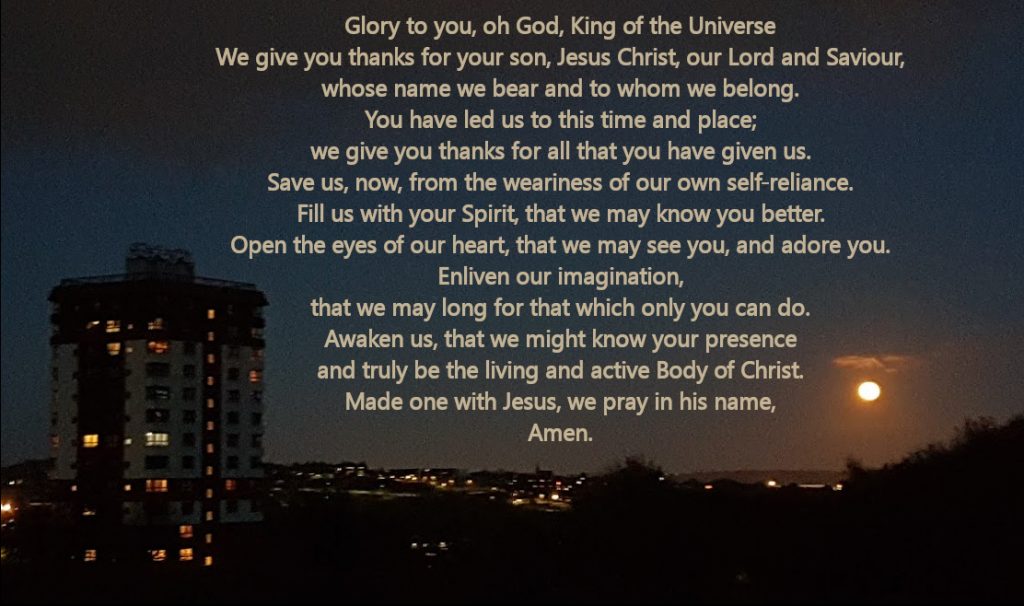A Prayer For Our Church
 Last week I was at a conference where the following words were used to describe our current circumstance:
Last week I was at a conference where the following words were used to describe our current circumstance:
Volatility
Uncertainty
Complexity
Ambiguity
I won’t unpack those words here; they speak for themselves. They certainly describe something of what it’s like to be working, living, and breathing within the context of a parish church (as well as more widely). The normal means and methods of planning and strategising are being lashed by this perfect storm.
And that’s OK.
In fact, in so many ways, these are the exact circumstances in which the church of God should revel and excel. This is not because we are more stable, certain, simple, and clear than any other part of society, but because the gospel we cling to speaks of a God who is! He is a rock and a refuge. Lo, he is with us always, to the very end of the age. Including in the storms.
In the light of this, I have been struck, recently, by how St. Paul prayed for his churches in the midst of their own volatile, uncertain, complex, and ambiguous days. He didn’t pray, first and foremost, for a change in their circumstances; he prayed for an opening of their eyes to see and know the one who is with them in all things.
16 I have not stopped giving thanks for you, remembering you in my prayers. 17 I keep asking that the God of our Lord Jesus Christ, the glorious Father, may give you the Spirit of wisdom and revelation, so that you may know him better. 18 I pray that the eyes of your heart may be enlightened in order that you may know the hope to which he has called you, the riches of his glorious inheritance in his holy people, 19 and his incomparably great power for us who believe.
Ephesians 1:16-19a
This is my prayer for the church, also.
9 …since the day we heard about you, we have not stopped praying for you. We continually ask God to fill you with the knowledge of his will through all the wisdom and understanding that the Spirit gives, 10 so that you may live a life worthy of the Lord and please him in every way: bearing fruit in every good work, growing in the knowledge of God, 11 being strengthened with all power according to his glorious might so that you may have great endurance and patience, 12 and giving joyful thanks to the Father, who has qualified you to share in the inheritance of his holy people in the kingdom of light.
Colossians 1:9-12
We have so much. We have theological and teaching resources. We have freedom to worship, and people to proclaim the word of life. We have resources of time and money. We have the necessary institutional frameworks. We absolutely have the opportunities to serve, care, and speak of the way of Christ. We might pray for more of these things, but we have them already.
Our plate is full, so to speak. What we need is a desire to eat and drink of that which has been given to us. This is eucharistic mystery: “Whoever eats my flesh and drinks my blood; has eternal life and I will raise them up on the last day” (John 6:54). We are happy to arrange the room, set the table, even welcome and serve the dinner guests; we have planning meetings and strategy documents and even some slick slideshows to prove it! We would do it all, but one thing we lack: to sit down and eat and drink of Jesus himself.
Oh that we would behold him. See him. Know him better. Yearn for him. Long for him. That we would be in orbit around him and have confidence that when he is known, and followed, as the Way, Truth, and Life, then – and only then – will the life-filled kingdom of God be on earth as it is in heaven.
So “open the eyes of our heart”, Lord! Just as Paul prayed long ago. Give us the Spirit by which we may see you and know you. Enlighten us with a revelation of how you are with us, and call us, and shape us, and change us, and move us. Awaken us, Lord, to the truth of who you are. Enliven us that we might overflow with the marks of the one to whom we belong. The rest of it will come from that. Without that, the rest of it is wearying and ultimately worthless; and I think we know that in our hungry spiritual bellies.
To that end, I’ve written a prayer for the church communities to which I belong. It’s not particularly precise or poetic, but I wonder if you might join me in praying it with me each day as we head quickly towards advent, the season in which we wait for the Lord. We will wait for the Lord.
Glory to you, oh God, King of the Universe
We give you thanks for your son, Jesus Christ, our Lord and Saviour,
whose name we bear and to whom we belong.
You have led us to this time and place;
we give you thanks for all that you have given us.
Save us, now, from the weariness of our own self-reliance.
Fill us with your Spirit, that we may know you better.
Open the eyes of our heart, that we may see you, and adore you.
Enliven our imagination, that we may long for that which only you can do.
Awaken us, that we might know your presence
and truly be the living and active Body of Christ.
Made one with Jesus, we pray in his name,
Amen.








